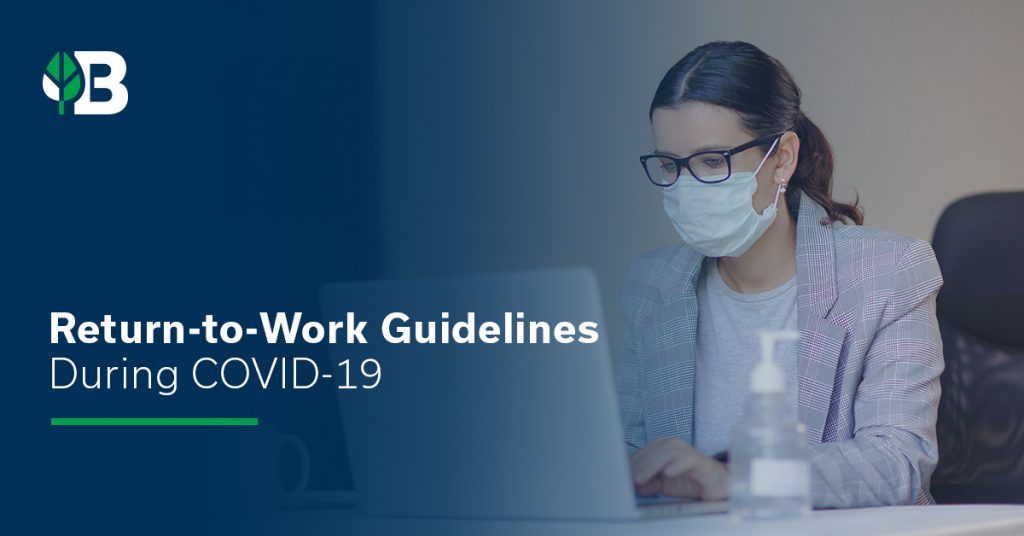
Managing COVID-19 Return-to-Work Issues
By James Beyer, Associate Counsel
There’s been a wealth of information released by various government agencies in recent weeks regarding workplace safety and equal employment opportunity issues. In April, the Department of Labor’s Occupational Safety and Health Administration (OSHA) reminded employers of their legal obligations when facing employee concerns about workplace safety. Similarly, the EEOC has been continually updating guidance on its website in a publication titled, “What You Should Know About COVID-19 and the ADA, the Rehabilitation Act, and Other EEO Laws.”
To help your organization navigate these uncharted waters, Broadleaf’s Associate Counsel James Beyer is here to provide insight on return-to-work issues during the pandemic:
If an employee expresses safety concerns or refuses to show up at work because of these safety worries, what are your options for dealing with this employee?
Under the Occupational Safety and Health Act of 1970, employers are responsible for providing safe and healthful workplaces for their employees. On April 8, 2020, OSHA reminded employers that it is illegal to retaliate against workers “because they report unsafe and unhealthful working conditions” during the coronavirus pandemic. Acts of retaliation can include terminations, demotions, denials of overtime or promotion, or reductions in pay or hours.
Customers may be interested in simply ending the assignment of problematic employees who make too much noise about workplace safety, but employers absolutely cannot take adverse employment action against employees who express genuine safety concerns. Often, the simplest way to allay employee safety concerns is to educate them about the steps your company and your customers are taking to provide a safe and healthy workplace. Please contact Legal and HR if an employee says, “There is nothing you can do that can make me feel safe.” Additionally, you should seek further guidance from Legal and HR if information about safety measures is provided to an employee, but the employee still refuses to come to work or causes a disruption in the workplace.
What should an employer do if an employee entering the worksite requests an alternative method of screening due to a medical condition?
Many customers are choosing to screen employees, including temporary workers, immediately when arriving on-site. Employers have begun to take workers’ temperatures and ask them other health-related questions. What happens if, for some reason, a worker requests an alternative method of screening because they have a specific medical condition?
The EEOC makes it clear that this would be a request for reasonable accommodation, and an employer should proceed as it would for any other request for accommodation under the ADA. If the requested change is inexpensive and easy to provide, the employer should generally voluntarily make it available to anyone who asks without having to go through an interactive process. Alternatively, if the disability is not obvious or previously known, employers have a legal obligation to engage in the interactive process, which simply means that employers have to talk to the employee to understand what his/her needs are. Employers can ask the employee for information to establish that the condition is a disability and what specific limitations require accommodation. If necessary, employers may also request medical documentation to support the employee’s request, and then determine an effective accommodation that can be provided, absent undue hardship.
Similarly, if an employee requests an alternative method of screening as a religious accommodation, employers would have to determine whether accommodation is available under Title VII, another federal anti-discrimination law. But if an employee simply dislikes having their temperature taken and their request is not tied to a medical condition or religious reason, employers need not provide accommodation.
You can read our first legal blog, “Lessons Learned from the First COVID-19 Lawsuits,” here.
For more insight on the best ways to deal with return-to-work concerns, you can also visit Broadleaf’s Facebook, LinkedIn, and Twitter.
Please note that the information provided in this blog does not, and is not intended to, constitute legal advice; instead, all information available on this blog is for general informational purposes only. Readers should contact their attorney to obtain advice with respect to any particular legal matter.




